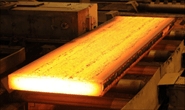Product

February 26, 2019
Commerce Denies Tariff Exclusions for CSI, Evraz
Written by Sandy Williams
The Bureau of Industry and Security, a division of the Department of Commerce, announced today that is has denied the requests from California Steel Industries and Evraz Steel for exclusion of semi-finished steel slabs from the Section 232 tariffs.
The BIS agreed with an analysis by the International Trade Administration that there is sufficient production, availability and quality of steel slab to meet the needs of CSI and Evraz.
“BIS accepts ITA’s recommended findings as to the domestic availability of the product and finds that no overriding national security concerns require that this exclusion request be granted notwithstanding the domestic availability. CBP has also advised BIS that the product description is inconsistent with the claimed classification under the Harmonized Tariff Schedule of the United States.”
AK Steel, U.S. Steel and Nucor were the primary objectors to the exclusion requests filed by CSI and Evraz.
Nucor, for example, cited in its objections to the CSI exclusion requests:
- CSI is requesting an exemption in excess of its actual needs.
- There is ample supply of steel slab in the United States.
- Steel slab is readily available from countries exempt from 232 tariffs.
- There is ample supply of CSI’s downstream products in the United States.
“Granting CSI’s product exclusion requests would directly undermine the President’s objective in imposing Section 232 tariffs – to enable the domestic industry to reopen idled facilities and increase production,” Nucor wrote in its objection. “Domestic steel producers are ready and willing to supply the slab required by CSI at commercially reasonable prices as well as the downstream products produced from that slab. Moreover, imports from countries likely to be exempted from the Section 232 duties, especially Brazil, would provide an additional source of supply for CSI. Lastly, there are no national security grounds for granting CSI’s requests. As a result, and consistent with the purpose of Section 232 relief, Commerce should deny CSI’s requests for continued access to massive volumes of imported steel slab at unduly low prices and at the direct expense of U.S. steel production.”
U.S. Steel added that CSI’s exclusion requests raise “significant circumvention concerns.”
Rerollers who filed the exclusion requests had been anxiously waiting for a decision from Commerce since the tariffs were imposed last March. To say they were disappointed with today’s announcement is an understatement.
Calls to end the Section 232 tariffs have been intensifying as downstream manufacturers are increasingly seeing higher costs from steel prices as well as retaliatory tariffs. Bills have been proposed in the House and Senate seeking to restrain the president’s ability to impose new tariffs and to remove those enacted. Ratification of the USMCA is clouded by the continued tariffs on Canada and Mexico.
On the other hand, capacity utilization rates for steel mills exceeded 80 percent last month and import levels continue to be subdued, prompting supporters of the tariffs to claim they are working as desired.
Key Banc analyst Phil Gibbs had the following comment on the slag exclusion denials: “Our contacts are indicating that the first batch of carbon slab exclusion rulings have arrived today, with the key takeaway that access is being denied on the grounds of domestic availability. While we disagree with those grounds, it underscores that the administration is willing to play trade hardball for longer. Thus far, we have heard >4M tons have been denied out of 36M exclusion requests (recall the need for exclusion requests to be overly redundant given mix optionality), or roughly 10-15 percent of total requested exclusions.” Key Banc estimates the U.S. import market for blooms, billets, and slabs is roughly 8.3 million tons.







